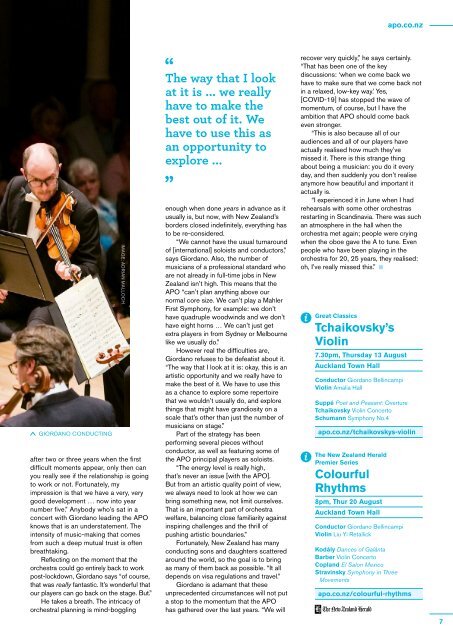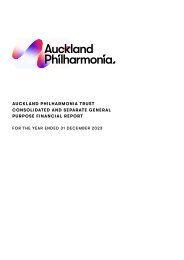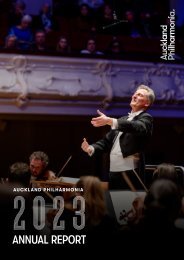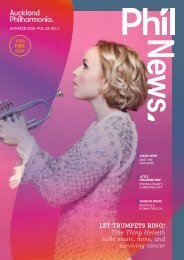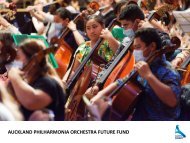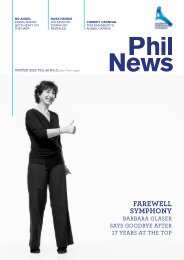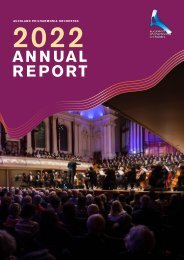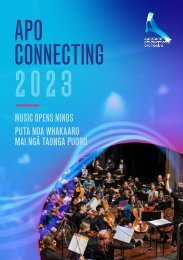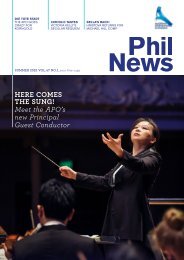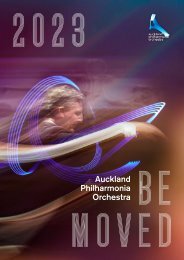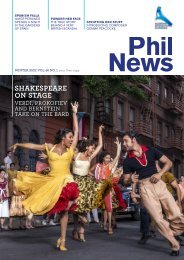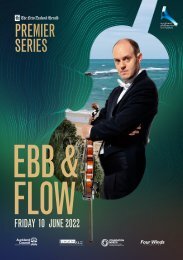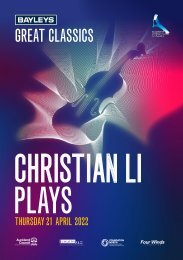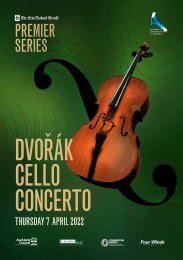Create successful ePaper yourself
Turn your PDF publications into a flip-book with our unique Google optimized e-Paper software.
apo.co.nz<br />
GIORDANO CONDUCTING<br />
IMAGE: ADRIAN MALLOCH<br />
after two or three years when the first<br />
difficult moments appear, only then can<br />
you really see if the relationship is going<br />
to work or not. Fortunately, my<br />
impression is that we have a very, very<br />
good development … now into year<br />
number five.” Anybody who’s sat in a<br />
concert with Giordano leading the <strong>APO</strong><br />
knows that is an understatement. The<br />
intensity of music-making that comes<br />
from such a deep mutual trust is often<br />
breathtaking.<br />
Reflecting on the moment that the<br />
orchestra could go entirely back to work<br />
post-lockdown, Giordano says “of course,<br />
that was really fantastic. It’s wonderful that<br />
our players can go back on the stage. But.”<br />
He takes a breath. The intricacy of<br />
orchestral planning is mind-boggling<br />
The way that I look<br />
at it is .… we really<br />
have to make the<br />
best out of it. We<br />
have to use this as<br />
an opportunity to<br />
explore .…<br />
enough when done years in advance as it<br />
usually is, but now, with New Zealand’s<br />
borders closed indefinitely, everything has<br />
to be re-considered.<br />
“We cannot have the usual turnaround<br />
of [international] soloists and conductors,”<br />
says Giordano. Also, the number of<br />
musicians of a professional standard who<br />
are not already in full-time jobs in New<br />
Zealand isn’t high. This means that the<br />
<strong>APO</strong> “can’t plan anything above our<br />
normal core size. We can’t play a Mahler<br />
First Symphony, for example: we don’t<br />
have quadruple woodwinds and we don’t<br />
have eight horns … We can’t just get<br />
extra players in from Sydney or Melbourne<br />
like we usually do.”<br />
However real the difficulties are,<br />
Giordano refuses to be defeatist about it.<br />
“The way that I look at it is: okay, this is an<br />
artistic opportunity and we really have to<br />
make the best of it. We have to use this<br />
as a chance to explore some repertoire<br />
that we wouldn’t usually do, and explore<br />
things that might have grandiosity on a<br />
scale that’s other than just the number of<br />
musicians on stage.”<br />
Part of the strategy has been<br />
performing several pieces without<br />
conductor, as well as featuring some of<br />
the <strong>APO</strong> principal players as soloists.<br />
“The energy level is really high,<br />
that’s never an issue [with the <strong>APO</strong>].<br />
But from an artistic quality point of view,<br />
we always need to look at how we can<br />
bring something new, not limit ourselves.<br />
That is an important part of orchestra<br />
welfare, balancing close familiarity against<br />
inspiring challenges and the thrill of<br />
pushing artistic boundaries.”<br />
Fortunately, New Zealand has many<br />
conducting sons and daughters scattered<br />
around the world, so the goal is to bring<br />
as many of them back as possible. “It all<br />
depends on visa regulations and travel.”<br />
Giordano is adamant that these<br />
unprecedented circumstances will not put<br />
a stop to the momentum that the <strong>APO</strong><br />
has gathered over the last years. “We will<br />
recover very quickly,” he says certainly.<br />
“That has been one of the key<br />
discussions: ‘when we come back we<br />
have to make sure that we come back not<br />
in a relaxed, low-key way.’ Yes,<br />
[COVID-19] has stopped the wave of<br />
momentum, of course, but I have the<br />
ambition that <strong>APO</strong> should come back<br />
even stronger.<br />
“This is also because all of our<br />
audiences and all of our players have<br />
actually realised how much they’ve<br />
missed it. There is this strange thing<br />
about being a musician: you do it every<br />
day, and then suddenly you don’t realise<br />
anymore how beautiful and important it<br />
actually is.<br />
“I experienced it in June when I had<br />
rehearsals with some other orchestras<br />
restarting in Scandinavia. There was such<br />
an atmosphere in the hall when the<br />
orchestra met again; people were crying<br />
when the oboe gave the A to tune. Even<br />
people who have been playing in the<br />
orchestra for 20, 25 years, they realised:<br />
oh, I’ve really missed this.”<br />
Great Classics<br />
Tchaikovsky’s<br />
Violin<br />
7.30pm, Thursday 13 August<br />
Auckland Town Hall<br />
Conductor Giordano Bellincampi<br />
Violin Amalia Hall<br />
Suppé Poet and Peasant: Overture<br />
Tchaikovsky Violin Concerto<br />
Schumann Symphony No.4<br />
apo.co.nz/tchaikovskys-violin<br />
The New Zealand Herald<br />
Premier Series<br />
Colourful<br />
Rhythms<br />
8pm, Thur 20 August<br />
Auckland Town Hall<br />
Conductor Giordano Bellincampi<br />
Violin Liu Yi Retallick<br />
Kodály Dances of Galánta<br />
Barber Violin Concerto<br />
Copland El Salon Mexico<br />
Stravinsky Symphony in Three<br />
Movements<br />
apo.co.nz/colourful-rhythms<br />
7


